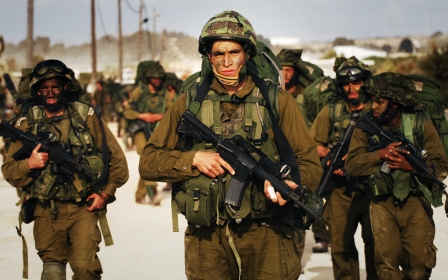Israeli officers 'abusive' in arrests of Palestinian children: HRW

JERUSALEM - Human Rights Watch (HRW) on Monday issued a scathing report on Israel’s "abusive arrests" of Palestinian children as young as 11, describing instances of Israeli police using threats to force youths to sign confessions.
Israeli authorities failed to inform parents of their children's arrest or whereabouts, the New York-based watchdog added, drawing on accounts of several children detained during intense unrest in East Jerusalem and the West Bank late last year.
HRW's Middle East director Sarah Leah Whitson urged the United States to pressure its Israeli ally to end what it said were long-standing "abusive practices".
The rights group issued the accusations as US Defence Secretary Ashton Carter began a visit to Israel.
"Israeli security forces have used unnecessary force to arrest or detain Palestinian children," it said in a report giving details of the "abusive arrests" of six children.
"Forces have choked children, thrown stun grenades at them, beaten them in custody, threatened and interrogated them without the presence of parents or lawyers, and failed to let their parents know their whereabouts."
Israel's army, when contacted by AFP, had no immediate comment on the report.
HRW said the military and justice ministry responded to its accusations and maintained that "security officials had adhered to the law in all cases, including by informing the children of their rights".
In one case, 11-year-old Rashid S, who was arrested in Israeli-occupied East Jerusalem in November, said officers put a bag over his head, kicked him and verbally abused him in Arabic, according to the rights group.
Rashid was accused of throwing stones during the months of unrest that rocked Jerusalem before and after a deadly July-August war in the Gaza Strip.
The Jerusalem protests, where armed Israeli forces clashed with stone-throwing Palestinians, were accompanied by a spate of killings of both Israelis and Palestinians.
In the West Bank, the HRW report said, 14-year-old girl Malak al-Khatib was violently arrested on suspicion of throwing stones at a road used by Jewish settlers, HRW quoted her mother as saying.
"Four soldiers beat her with something like a baton" during Malak's arrest until she lost consciousness, mother Khoula said.
"While on the ground, they kicked her and one soldier stepped on her neck."
In every case HRW documented, the Palestinian families said Israeli authorities "did not inform parents of the child's arrest and interrogated the children without permitting them to speak to a parent or lawyer prior to the interrogation."
Additionally, the report said Israeli interrogators “frequently use Hebrew to document the interviews [with Palestinian children] – only 138 of 440 interrogations they conducted in 2014 were documented in Arabic, according to the Israeli military.”
“This means that in many cases alleged confessions or other incriminating statements by detained children are documented in a language they do not understand, and there is no way to ascertain whether the documents were accurately translated to the children before they signed them.”
Three children, according to the report, "said they signed confessions written in Hebrew, a language they do not understand, after interrogators threatened them".
Children urinated on themselves out of fear during the arrests, and had nightmares afterwards, it said.
“The families of the 14-year-old girl and a 15-year-old boy said they were not allowed to visit or even call during their detention – 64 days for the girl and 110 for the boy,” it added.
In a high-profile incident during the July 2014 protests in East Jerusalem, Israeli officers grabbed 15-year-old Palestinian-American Tareq Abu Khdeir, bound his hands, and brutally beat him, video footage revealed. Critics said the international outcry that followed would have been unprecedented had Tareq not been an American citizen. The incident took place just days after the boy's 17-year-old cousin, Mohammed Abu Khdeir, was kidnapped, beaten and burned alive by three Israelis.
Stay informed with MEE's newsletters
Sign up to get the latest alerts, insights and analysis, starting with Turkey Unpacked
Middle East Eye delivers independent and unrivalled coverage and analysis of the Middle East, North Africa and beyond. To learn more about republishing this content and the associated fees, please fill out this form. More about MEE can be found here.




